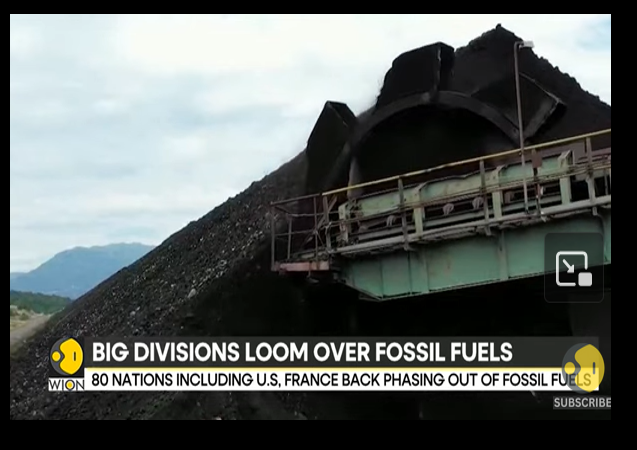Loopholes in COP28 Agreement Suggest the “Iron Law of Electricity” Triumphed in Dubai

The United Nations Climate Conference in Dubai (Conference of Parties 28 (COP28)) has officially wrapped-up.
Predictably, the media is hyping the agreement that features the “transitioning away from fossil fuels.” Yet the wording contains significant loopholes.
The consensus statement, agreed by nearly 200 countries at the conference in Dubai on 13 December, calls on countries to contribute to global efforts to transition away from fossil fuels in energy systems “in a just, orderly and equitable manner, accelerating action in this critical decade, so as to achieve net zero by 2050 in keeping with the science.” (emphasis mine)
Countries can count “carbon offsets” and still use fossil fuels. Furthermore, over the past few decades, we have been treated to a number of different interpretations of “the Science™” (e.g., the ice age of the 1970’s, and snow-free futures in the 1990’s). But it appears real science may have won the day, as “in keeping with the science,” the agreement recognizes fossil fuels cannot be effectively “phased-out” in the foreseeable future.
As I noted in a previous post, the “Iron Law of Electricity” states that people, businesses, and countries will do whatever they have to do to get the electricity they need. Interestingly, the COP28 agreement didn’t even force countries to end the use of the most demonized of fossil fuels, coal. And, in terms of energy production, coal is still king. . . with over a third of the world’s electricity coming from that energy efficient source.
I would like to share a case history of energy choices being made by policy makers who seem unmoved by activists gluing themselves to runways, defacing masterpieces, or vandalizing tourist sites.
Back in 2021, the Balkan nation of Bosnia Bosnia and Herzegovina (BiH) had significant reserves of brown coal. Bosnia pledged to end coal mining.
Within three decades, all of Bosnia’s coal mines and coal-fired energy plants will be closed. That’s according to a November 2020 pledge made by the government as one of the goals set for Bosnia eventually joining the EU.The Western Balkans is plagued by Europe’s worst air pollution. On still winter days, smoke from residential fireplaces and coal plants settles so thickly over some towns that it can be uncomfortable to breathe outside.
However, two years later, BiH has just recorded an increase in coal production.
The “Kreka” coal mines produced 120,000 tons of coal in October, which is about 20,000 tons more than the production achieved in September, and an additional increase is expected in the following period.“The trend of production growth creates the conditions for the regular settlement of obligations of the Mine, especially when it comes to the payment of gross salaries to employees,” announced Elektroprivreda BiH.
Climate watchdog groups are upset that BiH is ignoring the “pledge.”
Bosnia, Kosovo and Serbia have been rebuked by an environmental watchdog for a lack of concrete strategies to achieve their stated goals on reducing greenhouse gas emissions.The three Western Balkan countries have missed targets set in their National Energy and Climate Plans (NECPs) and made little effort to introduce concrete strategies to phase out using coal, Climate Action Network (CAN), a European NGO coalition fighting climate change, said in a report.”Persistent dependence on an outdated and inefficient coal fleet hampers the much-needed transition to renewable energy sources in the region, further complicated by the potential transition to fossil gas as indicated in the NECPs,” the report said.
In fact, the Balkan nations are wisely responding to market forces. Coal use is up all over the world . . . except in the nations that have decided to go all-in for the climate crisis nonsense about carbon dioxide.
Global coal use is expected to reach a record high in 2023 as demand in emerging and developing economies remains strong, the International Energy Agency (IEA) said in a report on Friday.Demand for coal is seen rising 1.4% in 2023, surpassing 8.5 billion metric tons for the first time as usage in India is expected to grow 8% and that in China is seen up 5% due to rising electricity demand and weak hydropower output, the IEA said.In the European Union and United States, however, coal use is set to drop by around 20% each in 2023, the report said.Coal use is not expected to decline until 2026, when the major expansion of renewable capacity in the next three years should help lower usage by 2.3% compared to 2023 levels, even with the absence or stronger clean energy policies.However, global consumption is forecast to remain well over 8 billion metric tons in 2026, the report said. To reach goals set by the Paris Agreement, the use of unabated coal would need to fall significantly faster, it added.
Countries can pledge all they want. However, bureaucratic agreements at elite conferences in swanky settings are not suicide pacts.
Clearly, those who actually implement policy back home are deciding that they like all the benefits of inexpensive and reliable electricity, as well as the profits associated with the selling of the means to produce that electricity.
CLICK HERE FOR FULL VERSION OF THIS STORY